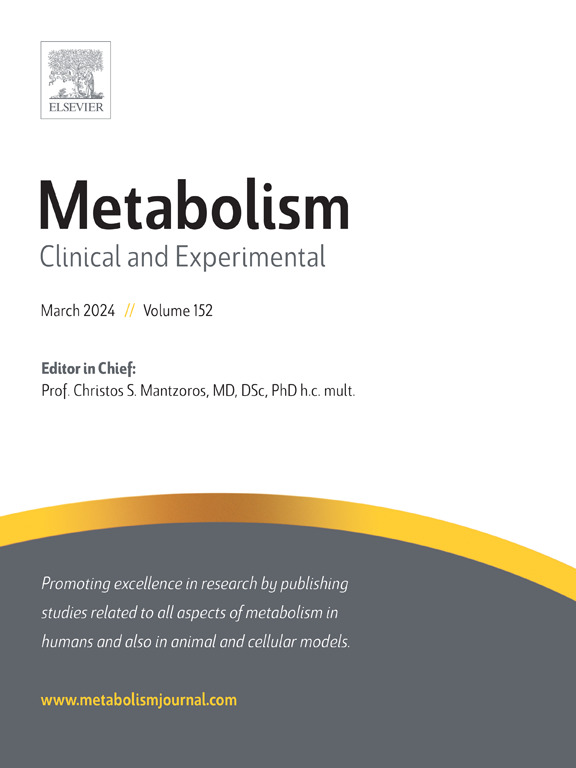Fructose-induced progression of steatohepatitis involves disrupting aldolase B-AMPK signaling in methionine adenosyltransferase 1A deficient mice
IF 10.8
1区 医学
Q1 ENDOCRINOLOGY & METABOLISM
引用次数: 0
Abstract
Objective
Aldolases (ALDO) are sensors that regulate AMPK via binding to fructose 1,6-biphosphate (FBP), an intermediate of glucose and fructose metabolism. Fructose consumption is linked to metabolic dysfunction-associated steatotic liver disease (MASLD) progression but whether ALDO-AMPK signaling is involved is unknown. Methionine adenosyltransferase alpha 1 (Mat1a) knockout (KO) mice have low hepatic S-adenosylmethionine (SAMe) level and spontaneously develop steatohepatitis. ALDOB methylation has not been reported and here we investigated whether SAMe level regulates ALDOB and ALDOB-AMPK signaling and whether fructose feeding accelerates MASLD progression by disrupting ALDOB-AMPK signaling.
Methods
Mass spectrometry identified ALDOB methylation sites and recombinant in vitro approaches assessed how methylation at those sites affects ALDOB oligomerization and activity. Primary hepatocytes cultured with high/low glucose and/or fructose and wild type (WT) and Mat1a KO mice fed with a high-fructose diet examined AMPK-ALDOB signaling and MASLD progression.
Results
In Mat1a KO livers ALDOB R173 is hypomethylated while ALDOB activity is enhanced. Recombinant ALDOB is methylated at R173 and R304 by protein arginine methyltransferase 1. Low hepatic SAMe level results in hypomethylated ALDOB, which favors the tetrameric form that has higher enzymatic activity, and higher capacity to signal to activate AMPK. Fructose, independently of glucose levels, inhibited AMPK activity and induced lipid accumulation in hepatocytes. Mat1a KO mice have hyperactivated AMPK and fructose feeding inhibits it, enhancing the accumulation of fat in the liver and the progression of MASLD.
Conclusion
Hepatic SAMe levels regulate ALDOB oligomeric state and enzymatic activity impacting on AMPK signaling and fructose-induced MASLD progression.
求助全文
约1分钟内获得全文
求助全文
来源期刊

Metabolism: clinical and experimental
医学-内分泌学与代谢
CiteScore
18.90
自引率
3.10%
发文量
310
审稿时长
16 days
期刊介绍:
Metabolism upholds research excellence by disseminating high-quality original research, reviews, editorials, and commentaries covering all facets of human metabolism.
Consideration for publication in Metabolism extends to studies in humans, animal, and cellular models, with a particular emphasis on work demonstrating strong translational potential.
The journal addresses a range of topics, including:
- Energy Expenditure and Obesity
- Metabolic Syndrome, Prediabetes, and Diabetes
- Nutrition, Exercise, and the Environment
- Genetics and Genomics, Proteomics, and Metabolomics
- Carbohydrate, Lipid, and Protein Metabolism
- Endocrinology and Hypertension
- Mineral and Bone Metabolism
- Cardiovascular Diseases and Malignancies
- Inflammation in metabolism and immunometabolism
 求助内容:
求助内容: 应助结果提醒方式:
应助结果提醒方式:


